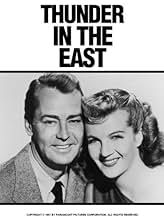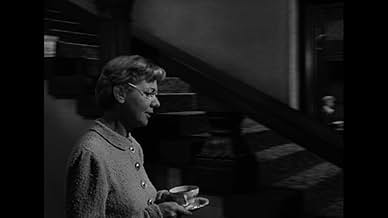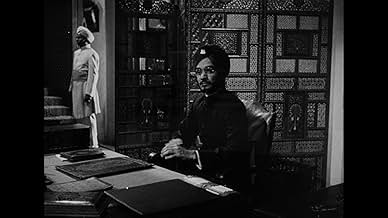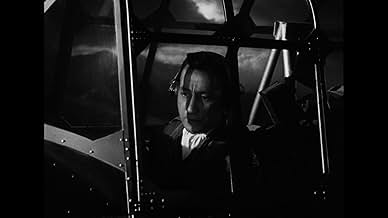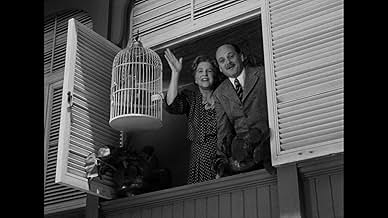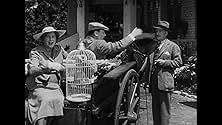IMDb RATING
6.3/10
478
YOUR RATING
In a remote region of post-independence India, the love of a blind British woman pricks the conscience of an arms dealer.In a remote region of post-independence India, the love of a blind British woman pricks the conscience of an arms dealer.In a remote region of post-independence India, the love of a blind British woman pricks the conscience of an arms dealer.
Marc Cavell
- Moti Lal
- (as Mark Cavell)
Charles Lung
- Maharajah
- (as Charlie Lung)
Frank Baker
- Englishman
- (uncredited)
Mohinder Bedi
- Palace Servant
- (uncredited)
Orlando Beltran
- Bus Driver
- (uncredited)
Bobker Ben Ali
- Azam Habibbudin
- (uncredited)
Benita Booth
- Englishwoman
- (uncredited)
Margaret Brewster
- Mrs. Corbett
- (uncredited)
Featured reviews
And one of Alan Ladd's best.
"Thunder in the East" boasts excellent direction by Charles Vidor, the camerawork of one of Hollywood's master cinematographers, Lee Garmes (who worked on most of the Von Sternberg-Dietrich masterpieces), and memorable performances by Ladd, Deborah Kerr, Charles Boyer, Cecil Kellaway, John Williams, and virtually everyone involved. The romance between Ladd and Kerr is poignant and unforgettable ("The awning is still blue."), and Kerr is a standout as a blind woman who's afraid to leave the city that she was born in, and knows so well that she can walk through as if she had sight.
The film's political message won't appeal to pacifists, and while there is only one real action scene at the end, the offscreen acts of violence leading up to it are extremely disturbing: a bus load of refugees, many of them children rides off with the children happily singing a song. We later hear that the bus was attacked and that everyone on board had been killed. An English couple attempts to evacuate by driving off in a horse and carriage, only to have their empty carriage return, and one of the main characters has his hand cut off by the bad guys (the attacking Muslim forces) in an attempt to persuade him into complying with their demands.
The open ending, described as "abrupt" in some of the other reviews is a decade ahead of its time. I like to think the odds are in favor of our heroes -- however the main point is that each of the men advancing toward the camera (the primary and secondary protagonists) has undergone a profound change in character as a result of the events they've become embroiled in.
Yes, the film feels a little like "Casablanca" at times (is this a bad thing?); and, no, it isn't quite as great as "Casablanca" (few films are); but while it's not as enjoyable, it's much darker, more realistic (in spite of being set in a fictional state), has a deeper, more profound message, and a much more adult approach. "Casablanca" works so well because the overriding air of cynicism is merely a pose -- with the two most jaded characters (Rick and Louis) finding a cause to believe in. "Thunder in the East" offers little in the way of hope -- only violence (with superior force) can save one from violence. And even then, the outcome remains unknown.
I've only given this film 9 stars because it never rises to the level of a cinematic masterpiece (like "The Third Man," "The Lady from Shanghai," "Orphee," "Meshes of the Afternoon," "The Seventh Seal," or "Shane") -- but for a "standard" Hollywood film, I rank this with the "Greats."
"Thunder in the East" boasts excellent direction by Charles Vidor, the camerawork of one of Hollywood's master cinematographers, Lee Garmes (who worked on most of the Von Sternberg-Dietrich masterpieces), and memorable performances by Ladd, Deborah Kerr, Charles Boyer, Cecil Kellaway, John Williams, and virtually everyone involved. The romance between Ladd and Kerr is poignant and unforgettable ("The awning is still blue."), and Kerr is a standout as a blind woman who's afraid to leave the city that she was born in, and knows so well that she can walk through as if she had sight.
The film's political message won't appeal to pacifists, and while there is only one real action scene at the end, the offscreen acts of violence leading up to it are extremely disturbing: a bus load of refugees, many of them children rides off with the children happily singing a song. We later hear that the bus was attacked and that everyone on board had been killed. An English couple attempts to evacuate by driving off in a horse and carriage, only to have their empty carriage return, and one of the main characters has his hand cut off by the bad guys (the attacking Muslim forces) in an attempt to persuade him into complying with their demands.
The open ending, described as "abrupt" in some of the other reviews is a decade ahead of its time. I like to think the odds are in favor of our heroes -- however the main point is that each of the men advancing toward the camera (the primary and secondary protagonists) has undergone a profound change in character as a result of the events they've become embroiled in.
Yes, the film feels a little like "Casablanca" at times (is this a bad thing?); and, no, it isn't quite as great as "Casablanca" (few films are); but while it's not as enjoyable, it's much darker, more realistic (in spite of being set in a fictional state), has a deeper, more profound message, and a much more adult approach. "Casablanca" works so well because the overriding air of cynicism is merely a pose -- with the two most jaded characters (Rick and Louis) finding a cause to believe in. "Thunder in the East" offers little in the way of hope -- only violence (with superior force) can save one from violence. And even then, the outcome remains unknown.
I've only given this film 9 stars because it never rises to the level of a cinematic masterpiece (like "The Third Man," "The Lady from Shanghai," "Orphee," "Meshes of the Afternoon," "The Seventh Seal," or "Shane") -- but for a "standard" Hollywood film, I rank this with the "Greats."
This film would have been more believable had it been set in Arizona or a similar location, where the "Foreign Leigion" is the US Cavalry, with Anthony Quinn the sergeant , the naughty natives were the Apaches ... and somehow a contrived "Lost City" was stumbled upon somewhere west of Tuscon !!
But "clean" , dry-skinned French cavalry stumbling over a "lost" city in Algeria (with Indian dances and a Maharaja !) and scantily-clad , beautifully-groomed liberal ladies must have raised a few eyebrows even in 1953 !
Still , I hope someone (s) made a small living out of this wasted effort in time and money.
But "clean" , dry-skinned French cavalry stumbling over a "lost" city in Algeria (with Indian dances and a Maharaja !) and scantily-clad , beautifully-groomed liberal ladies must have raised a few eyebrows even in 1953 !
Still , I hope someone (s) made a small living out of this wasted effort in time and money.
I guess the 1952 audience was certainly not satisfied with the ending,which abruptly comes as the heroes are still in action. Ending a movie like that was not obvious at the time.
The biggest flaw is French actor Charles Boyer,ridiculously made up as a Hindu.This character,a Gandhi disciple, puts forward wisdom,prayers,peace and love to cowardice and reactionary mind (the English) greed(Alan Ladd's character) , violence (his brothers ,the rebels),and complete irresponsibility (the caricature of a maharajah).He's the only positive character of the story along with the minister and his blind niece (Kerr).It's absolutely impossible to believe Boyer is an Indian ,mainly if you've seen him as a French lover!Besides,he finally demonstrates the opposite of what he stood up for . Ladd's evolution is predictable,from a greedy businessman to a hero (thanks to the blind girl of course).One should notice that Deborah Kerr is too great an actress to play such a poor part that would be suitable for a B movie starlet.Her intellectual playing does not match with down-to-earth Alan Ladd.The movie also suffers from a shoestring budget.
Take George Cukor's "Bhowani junction"(1956) instead.
The biggest flaw is French actor Charles Boyer,ridiculously made up as a Hindu.This character,a Gandhi disciple, puts forward wisdom,prayers,peace and love to cowardice and reactionary mind (the English) greed(Alan Ladd's character) , violence (his brothers ,the rebels),and complete irresponsibility (the caricature of a maharajah).He's the only positive character of the story along with the minister and his blind niece (Kerr).It's absolutely impossible to believe Boyer is an Indian ,mainly if you've seen him as a French lover!Besides,he finally demonstrates the opposite of what he stood up for . Ladd's evolution is predictable,from a greedy businessman to a hero (thanks to the blind girl of course).One should notice that Deborah Kerr is too great an actress to play such a poor part that would be suitable for a B movie starlet.Her intellectual playing does not match with down-to-earth Alan Ladd.The movie also suffers from a shoestring budget.
Take George Cukor's "Bhowani junction"(1956) instead.
This film, despite its heavy-handed Hollywood attempt at making heroes out of villains, is a perfect example of how Hollywood handled misinformation in the 1940s and 1950s. American Indians were bad and every Westerner from the Mayflower to California was good. Then, as we got older, we realized just the opposite was true. England was good and anyone who opposed them was bad. And as we got older, we learned that was all lies as well. Occasionally, both the US and England were on the right side of morality, as in WW1 and WW 2, but more often than not, there were merely colonialists and imperialists; especially after WW 2. This film is a perfect example of that. US arms dealer and fuddy-duddy UK colonialists along with a spineless Indian leader. No wonder the Pakistinians took whatever they wanted in the north and broke away from India. Absolutely no relationship to reality.
Simply a daft film... a very silly film. Ludicrous casting and script though the historical setting and subject matter has real possibilities. The ending was so ridiculously predictable. Alan Ladd playing a sort of B movie gun runner, Charles Boyer playing an Indian... the interest in this film being just how amusingly silly it was.
Did you know
- TriviaFilm debut of Jill St. John.
- ConnectionsReferenced in O Espectador que o Cinema Esqueceu (1991)
- How long is Thunder in the East?Powered by Alexa
Details
Box office
- Gross US & Canada
- $2,000,000
- Runtime
- 1h 37m(97 min)
- Color
- Aspect ratio
- 1.37 : 1
Contribute to this page
Suggest an edit or add missing content

